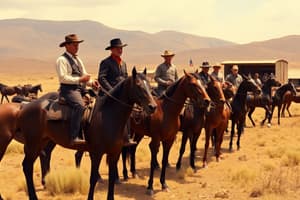Podcast
Questions and Answers
Which event marked the beginning of significant westward expansion in the United States?
Which event marked the beginning of significant westward expansion in the United States?
- Mexican American War
- Oregon Trail migration (correct)
- Annexation of Texas
- Gold rush in California
What was the primary purpose of the Emancipation Proclamation issued in 1862?
What was the primary purpose of the Emancipation Proclamation issued in 1862?
- To address the Dred Scott case
- To promote Reconstruction efforts
- To officially end the Civil War
- To free slaves in the Confederate states (correct)
Which president was most significant during the Civil War era according to historical assessments?
Which president was most significant during the Civil War era according to historical assessments?
- Ulysses S. Grant
- Andrew Johnson
- Abraham Lincoln (correct)
- James Buchanan
What was a consequence of the Dred Scott case decided by the Supreme Court?
What was a consequence of the Dred Scott case decided by the Supreme Court?
Which of the following was a significant development in the period of Civil War and Reconstruction regarding race relations?
Which of the following was a significant development in the period of Civil War and Reconstruction regarding race relations?
Flashcards
Manifest Destiny
Manifest Destiny
The belief that the U.S. was destined to expand across the continent.
Civil War
Civil War
A war between the Union (North) and the Confederacy (South) over slavery and states' rights.
Reconstruction Amendments
Reconstruction Amendments
Constitutional amendments (13, 14, 15) abolishing slavery and ensuring equal rights for African Americans.
Dred Scott Case
Dred Scott Case
Supreme Court ruling that slaves were not citizens and had no rights.
Signup and view all the flashcards
Election of 1860
Election of 1860
Election of Abraham Lincoln that led to the secession of several Southern states.
Signup and view all the flashcardsStudy Notes
Westward Expansion (1844-1876)
- Westward expansion led to debates about slavery in territories.
- Manifest Destiny fueled expansionist ideology.
- California Gold Rush spurred migration.
- Oregon Trail facilitated westward travel.
- Annexation of Texas and the Mexican-American War resulted in territorial gains.
- Conflicts with Native Americans persisted.
- Antislavery movements gained strength.
- The Underground Railroad aided runaway slaves.
- The Fugitive Slave Act was undermined.
- The Dred Scott case heightened the slavery debate.
- Anti-immigration sentiments targeted Chinese and Asian immigrants.
- Violence and scrutiny were faced by immigrants.
Civil War (1860-1865)
- Abraham Lincoln's election triggered Southern secession.
- Seven states seceded before Lincoln's inauguration; four more later.
- Four border slave states remained in the Union.
- Both sides experienced internal opposition.
- The Emancipation Proclamation (1862) declared slaves in Confederate territory free.
- The North won the Civil War due to military and economic advantages.
Reconstruction
- Amendments 13, 14, and 15 were passed to guarantee rights and freedoms for African Americans.
- Violence against Black Americans persisted.
Key Conflicts and Issues
- Westward Expansion, involving Native American displacement, was a significant conflict.
- President Polk epitomized Manifest Destiny.
- Slavery was a significant divisive issue sparking the Civil War.
- Reconstruction aimed to rebuild the South and grant rights to formerly enslaved people.
Important Figures (AP Focus)
- Abraham Lincoln was the most important president during this era for the AP exam.
Studying That Suits You
Use AI to generate personalized quizzes and flashcards to suit your learning preferences.




